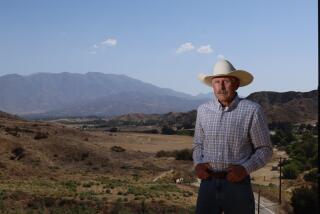City Orders Economic Impact Study on Proposed Development : Thousand Oaks: The council is concerned about the effects the large Adventist project could have on smaller businesses.
Councilwoman Jaime Zukowski says she’s as happy as anyone when big-name department or discount stores move into Thousand Oaks and start sending a gush of sales-tax dollars to City Hall.
But every jingling cash register at a Circuit City or Home Depot sparks fear as well as excitement, Zukowski says. Her primary concern: that large chains are driving long-established mom-and-pop stores out of business.
To help determine just how much the so-called “big box majors” affect small family businesses, the Thousand Oaks City Council has ordered up an economic impact study assessing a proposed development on the Seventh Day Adventist property in Newbury Park.
And, in an unusual step to ensure the study’s objectivity, the council has requested that city staff--not the developers--work directly with the consultant.
“In the past few years, there has been this competition among cities to pack in what they can in terms of big box users, and sometimes the decision-making is not based on the healthiest economic or community principles,” Zukowski said, explaining the rationale for ordering an economic impact study on the Adventist development.
“It’s often looked at as ‘Hey, there’s a big chunk of sales tax dollars coming from one company,’ and it’s true, there is a big injection of income,” Zukowski said. “But you have to also talk about the other businesses that are affected, because they have given a lot to the community in ways that may not always be measured.”
The council’s last attempt to assess the economic impact of a proposed retail center came more than a decade ago, when a consultant evaluated plans to build a major strip mall on the Cohan property in Newbury Park--a project that later collapsed.
The only other such study was commissioned for The Oaks mall, back in 1978.
Because of the size and scope of the Adventist proposal--which calls for a bevy of one-story buildings on a parcel the size of The Oaks shopping center and parking lot--the council decided last month to step in. The Adventists will pay the $29,400 consultant fee.
“It’s rare that the city would require this kind of study,” senior planner Lawrence Marquart said.
“But people in the community have raised the questions: ‘What about the commercial businesses that are teetering on the brink? What will the infusion of 85 additional acres of commercial space do to existing businesses?’ “Marquart said. “Those are valid questions.”
Most small-business owners already think they have the answers.
After years of David-and-Goliath battles against Kmart, Toys R Us, Office Depot and other national chains, they greet the prospect of more competition with weary resignation--but surprisingly not outright pessimism.
Entrepreneurs who have survived Thousand Oaks’ first influx of discount stores are reasonably confident that they will keep most of their customers even if a Target, Mervyn’s or Staples moves into the area.
“I despise Circuit City,” said Dennis Grodman, owner of a television and video store on Thousand Oaks Boulevard. “But a place like that wouldn’t put us out of business.”
Grodman, like other small-business owners, said he has found a niche--in his case, quick repairs and free, immediate delivery--that allows him to compete with the big chains. He checks out Circuit City’s sales once a week and adjusts his prices accordingly.
That strategy worked for Councilman Frank Schillo, who said his recent purchase of a television set at Grodman’s--after some serious comparison shopping--persuaded him that the little guy can compete with national chains.
“I cannot believe that when one business comes in, another one goes out,” he said.
Schillo will get a chance to test the scientific validity of his gut instinct when the economic impact study is released in the next six weeks. An environmental impact report on the Adventist project is also in the works, and should be available for review in March.
While they wait for the consultants’ reports, Adventist property developers have been busy with some paperwork of their own.
They recently filed applications for a zone change on part of their 400-acre parcel adjacent to the Rancho Conejo Industrial Center, just north of the Wendy Drive interchange at the Ventura Freeway.
Project directors Francisco Behr and Dale Ortmann would like permission to change the zoning so they can build retail centers, restaurants and perhaps a multiplex cinema on the site.
They would like to replace the current hodgepodge of Adventist buildings--a boxy yellow school, rambling equestrian center and tidy senior citizen bungalows--with a modern commercial center.
As envisioned, the project would include a sprawling Target store and two other major chains, including a discount warehouse. A separate building--also one-story with a red tile roof--would house smaller stores, strip-mall style.
A third phase of construction might bring in a food court and entertainment plaza filled with bookstores, record stores and movie theaters.
The Thousand Oaks City Council will decide Tuesday whether to hold a study session next month to explore the project’s details. Formal public hearings are expected to begin in the spring.
Already, the Adventist team has zeroed in on its key argument.
“Thousands of people go over the Conejo Grade to shop, taking their money out of the city,” architect Behr said. “This project will give the city an opportunity to stop the leakage of sales-tax dollars.”
If their commercial development wins council approval, the Adventist Church would move its school, sanctuary and senior housing to a now vacant church property. The Seventh Day Adventists own more than 400 acres in Newbury Park.
To accommodate shoppers’ traffic in the new mall, they would redesign the freeway exit and extend Wendy Drive north.
Building the new road, installing utilities and readying the site for construction would cost the Adventist Church at least $50 million.
*
On top of that price tag, each individual tenant would pay for building a chunk of the commercial center. Target, for example, might have to spend $10 million to purchase a plot of land and build its store according to the Adventist Church’s strict design criteria, Ortmann said.
Despite the huge expense, Adventist leaders confidently predict they will attract tenants.
They are certain the economic impact study will show that Thousand Oaks needs a new regional shopping center, especially now that biotechnology giant Amgen has announced plans to hire thousands more workers over the next decade. Amgen, Baxter Labs and Blue Cross are all located just a few miles from the Adventist property.
Also working in the Adventist Church’s favor, the Conejo Valley retail vacancy rate has dropped to 7%, the lowest in Ventura County.
Even the Adventists’ competitors agree that the area can absorb another mall.
“I think it will only change retail for the positive,” said Barbara Teuscher, general manager of The Oaks.
Noting that Thousand Oaks bargain-hunters now travel to Simi Valley or Oxnard for discount stores, Teuscher said the Adventist project could convince more residents to shop locally.
Another boon for the local sales-tax pot will be renovations at the Janss Mall, including the addition of a Mervyn’s department store, a Barnes & Noble bookstore, The Wherehouse record store and The Good Guys electronic store.
“New stores improve business because they draw more people to a community,” Teuscher said.
“I don’t think anyone wants to see retail along Thousand Oaks Boulevard destroyed, and the city has an obligation to protect that,” she said. “But it’s not the kind of situation where you build something and then every shop across the street goes down the drain.”
Tracey Benedict, owner of The Bookaneer on Thousand Oaks Boulevard, agreed. The presence of another Barnes & Noble or Crown Books would make her job tougher, she said, but customers seeking “the personality of a small business” still flock to her tiny store.
“Put it this way,” she said. “I would be happy if (the national chains) don’t come in. But we do have a special niche. I don’t think they would drive us out of business.”
More to Read
Sign up for Essential California
The most important California stories and recommendations in your inbox every morning.
You may occasionally receive promotional content from the Los Angeles Times.










